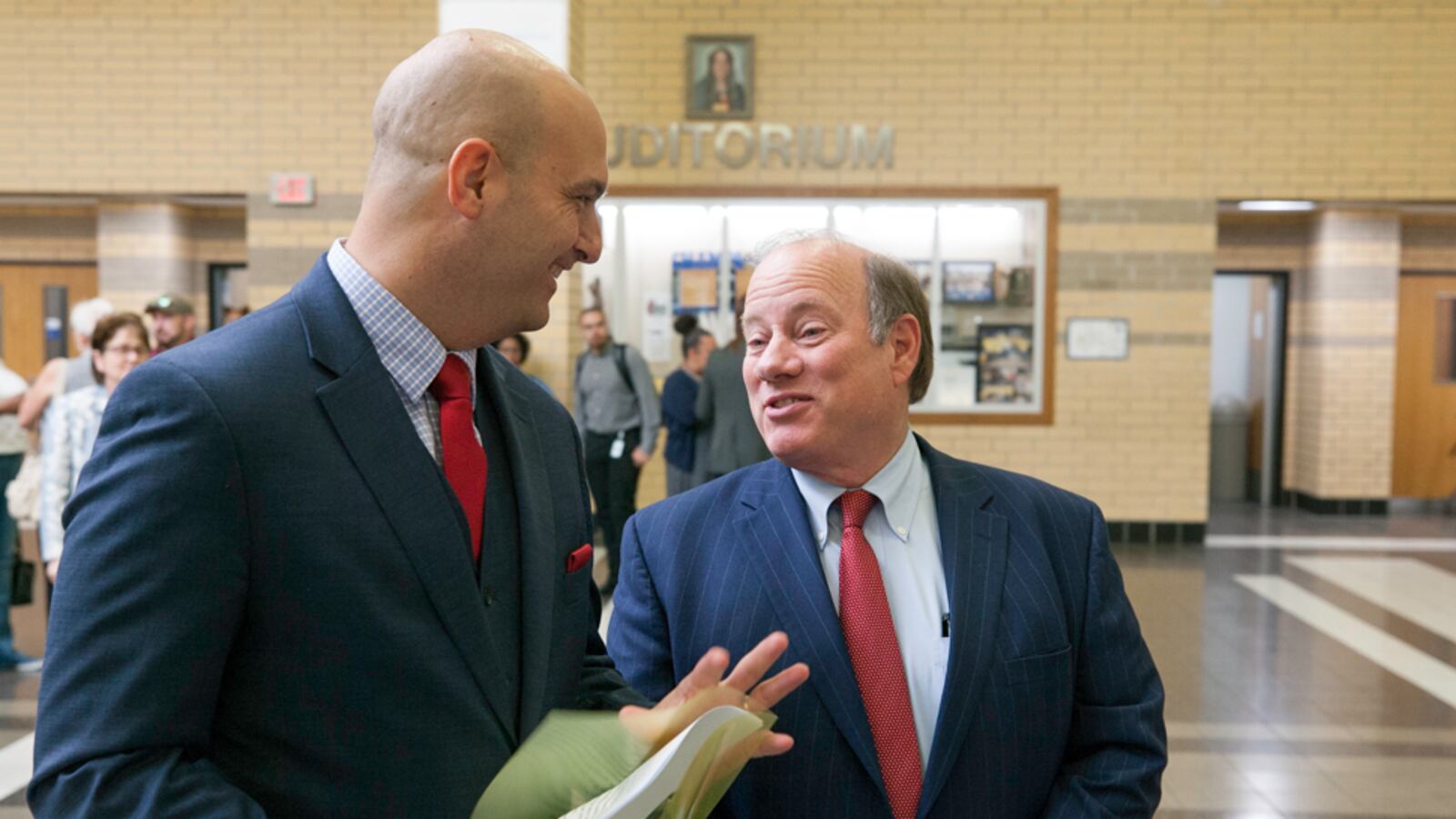For the first time in years, Detroit’s mayor will have a small hand in shaping education in the city.
A new commission, whose nine members will be appointed by Mayor Mike Duggan, will include representatives of the main Detroit school district and charter schools, whose competition for teachers and students has made them reluctant to come to the same table.
The group will focus on services that have fallen between the cracks in a city where decisions about transportation and after-school programming are made by dozens of unaffiliated charter schools in addition to the main district.
The commission will run a new bus route that will transport students to both district and charter schools on Detroit’s northwest side — a controversial proposal that got official approval from the Detroit school board this week.
It will lead an effort to grade city schools, taking over for the advocacy group Excellent Schools Detroit, which dissolved last year. The rating system has the potential to dramatically impact the fortunes of schools whose survival depends on their enrollment figures.
And it will serve as a conduit for philanthropic dollars that could lead to other cooperative programs between district and charter schools typically wary of working together.
The mayor’s involvement is politically delicate in a city where years of state intervention in local schools have left voters wary of outsiders overruling the elected school board.
The school board’s decision to support the effort was controversial, with critics at a public meeting this week arguing that the board was giving up too much authority to the mayor.
But Vitti argued successfully that the district is carefully limiting its involvement in the effort with an eye toward preserving local control. He pointed to guidelines for the commission that insist, in bold print, that it “will not encroach” on work being done by existing school operators in Detroit.
Following the board’s approval, Vitti will be among the mayor’s appointments to the commission, which will also include parents and educators from both district and charter schools, a teachers union representative, and community leaders (see below for a full list).
The commission plans to meet eight times a year, and will voluntarily submit to state open records laws, according to its guidelines. It will not begin meeting until Duggan has formally appointed directors to the commission. It’s not clear when that will be.
But as plans for the commission emerge, equally important is what’s missing.
It won’t have the power to hold district and charter schools to performance standards. It won’t be able to determine which schools in the city open and close, and — crucially for a city where many neighborhoods lack access to a quality school — it won’t decide where new schools are located.
Earlier proposals, including one for a powerful central body called the Detroit Education Commission, would have done all of those things, placing substantial school oversight responsibilities in the hands of Detroit’s mayor for the first time since mayoral control of schools ended in 2005. Following a fierce lobbying effort, state lawmakers rejected the plan in 2016.
That was a defeat for advocates who have long pushed for an organization that can bring cohesion to the city’s schools. They argue that the proliferation of school options in Detroit and elsewhere is creating problems for families in low-income, urban districts. Detroit has plenty of schools, but large swaths of the city lack a quality option, and some families must make extreme sacrifices to navigate the system.
Other cities with high concentrations of charter schools have created centralized school agencies. In New Orleans and Washington, parents can go to a single agency to learn about individual schools and enroll their children.
The intent of the Detroit commission is similar, but its scope has been constrained by fierce opposition from both ends of the ideological spectrum.
On one side, those criticisms have not dissipated. Vitti sought to reassure board members on Tuesday that the commission won’t undermine local control.
“A rating system is inevitable, and this allows us to create a rating system with Detroit stakeholders, not led by a process in Lansing,” he said.
That argument was enough to win over most the board, but not everyone was convinced. Voters “elected a board that would work with them,” said LaMar Lemmons, one of the “nos” in a 5-to-2 vote. “I am vehemently opposed to giving away our authority.”
Lemmons also opposed the Detroit Education Commission when it went before the state legislature in 2016. “The mayor should not have anything — absolutely anything — to do with the schools,” he said Tuesday.
He was joined in that view in 2016 by Betsy DeVos, now the U.S. Secretary of Education, whose school choice advocacy groups donated $1.45 million to state legislators in a matter of weeks to forestall what they viewed as a new layer of charter school oversight.
This time, however, charter advocates didn’t show up to oppose the pared down commission.
“We all need to work together on how schools are evaluated,” Dan Quisenberry, president of a charter organization, the Michigan Association of Public School Academies, said. “Transportation? Yes, please.”
But he cautioned against the “other extreme,” in which official oversight powers would be handed to the mayor’s office.
Expected appointees to the Community Education Commission include Vitti, district teacher Marsha Lewis, charter school operator Ralph Bland; charter school teacher Rachel Ignagni; at least one parent of a child attending school in the city of Detroit; and Nate Walker of the American Federation of Teachers.
The remaining slots are expected to go to activists and non-profit leaders, including Monique Marks of Franklin-Wright Settlements; Tonya Allen of the Skillman Foundation; Teferi Brent of Detroit 300/Goodwill Industries; and Sherita Smith of Grandmont-Rosedale Community Development. All will be unpaid.

